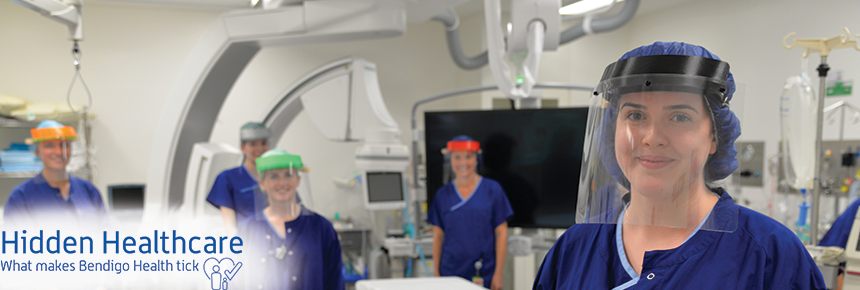 La Trobe University used their 3D printer to create reusable face shields and headsets for Bendigo Health staff, which are currently being used in theatre.
La Trobe University used their 3D printer to create reusable face shields and headsets for Bendigo Health staff, which are currently being used in theatre.
As cases of Coronavirus began to pop up across mainland Australia, Karen Shepherd-Clark got the impression the national Personal Protective Equipment (PPE) cupboards looked worryingly bare.
“What a lot of people don’t realise is that the government handed out millions of face masks during the bushfires, which came from the national warehouse,” she said.
Karen, Director of Materials Management at Bendigo Health, began to try and secure a supply of masks and other PPE, but by late March realised the situation was becoming precarious.
Panic PPE buying and a halt in manufacturing overseas due to international COVID cases which led to huge gaps in the supply chain that Federal and State Governments were trying to fill.
Measures like the reduction of elective surgery and cancelling of non-urgent dental surgery were implemented to try and reduce the use of PPE.
“We didn’t have enough to get us through. I believe the lockdown was partly informed by equipment and PPE. The lockdown provided the government an opportunity to build that stock coming in from China,” she said.
“The slow boat from China suddenly became a fast plane.”
At Bendigo Health, with clinical staff becoming increasingly anxious about supply, a PPE governance group was established to monitor the situation, focusing on the quality of what was coming in and what was being used.
Bendigo Health Supply and Loading Dock Manager Karen Arnett managed PPE procurement and distribution, working closely with senior clinicians to ensure frontline staff had the PPE they needed to feel safe.
By April, the State Government had established a central PPE warehouse in Clayton, where orders would be placed by all health services across the state.
“We had to try and figure out what appropriate PPE to provide protection to staff with what we had available,” she said.
Gowns and face masks were the primary concern of all healthcare services, Karen said.
Gowns
Single-use impervious gowns, the most appropriate for use in a pandemic, were “not really a high use item” in Australia, Karen said.
“We only use them for gastro cases and infectious diseases, so the supply wasn’t great,” she said.
As a contingency, staff in high-risk areas, like the Emergency Department, the COVID-19 Screening Clinic, Intensive Care Unit and the respiratory wards began wearing impervious, long sleeve, washable linen gowns with a plastic apron over the top.
Bendigo Health have subsequently sought a more sustainable long-term solution to the linen gowns, which came in the form of a prototype fabric gown made by Mooroopna-based linen supplier, Gouge.
The re-usable fabric gown is impervious and has a microchip inside it to monitor the integrity of the impervious coating.
Karen said the product is Therapeutic Goods Administration approved, can be washed up to 50 times and will be used at Bendigo Health in mid-August.
Masks
The quantity and type of masks being supplied from the central warehouse was initially inconsistent, so more contingencies were put in place, Karen said.
“There was plan A if we had the best quality masks and plan B was to use a face shield and a lesser quality mask,” she said.
The top quality, N95 masks were saved for clinical care of COVID-19 positive patients and level 2 masks used in high-risk clinical areas.
La Trobe University helped bolster protective stocks by using their 3D printer to create reusable face shields and headsets.
Around 250 face shields and 120 headsets have been delivered to Bendigo Health and are currently being used in theatre, as COVID-19 cases in Greater Bendigo have not spiked as predicted.
“We haven’t had the COVID-19 positive population to need many of the face shields and fingers crossed that situation remains,” Karen said.
La Trobe University professor of practice in engineering Chris Stoltz said the university wanted to use its expertise to help the community.
“We felt in the initial stage of the shutdowns the figures were pretty horrific and scary and we felt that places like Bendigo might miss out (with equipment, resources) and the whole idea was to provide resources for our local community,” he said.
Numerous local organisations donated protective masks to Bendigo Health, support which Karen described as “overwhelming”.
As the pandemic progressed, DHHS and Health Purchasing Victoria have continued to build the stock of COVID-19 suitable masks and other PPE and are now in a good supply position to protect our healthcare workers through the second waves of outbreaks we’re currently experiencing in Victoria and the foreseeable future, she said.
“Supply will be sufficient provided we all continue to use PPE responsibly,” Karen said.